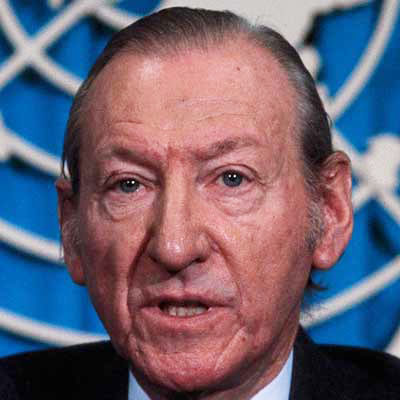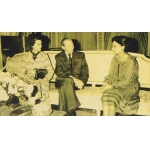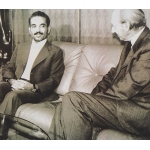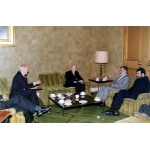Waldheim, Kurt
Leila Heydari Bateni
293 بازدید
Kurt Waldheim (1918–2007) who served as the fourth Secretary-General of the United Nations, sought to mediate and establish peace between Iran and Iraq following the outbreak of Iraq's imposed war against Iran. Despite measures such as sending a special envoy to both countries and offering peace proposals, he did not believe Iraq was the aggressor and made no efforts to end the war.
Kurt Waldheim was born in Austria in 1918. He studied at the University of Vienna and joined the Austrian diplomatic service in 1945. From 1948 to 1951, he served as the First Secretary of Austria's embassy in Paris, and later, he was appointed Austria's ambassador to Canada. Between 1968 and 1970, Waldheim served as the Austria’s Foreign Minister. In January 1972, Thant succeeded him as Secretary-General of the United Nations. Seen more politically astute than his predecessors, he remained in this role until December 1981, serving two terms.[1]
Waldheim visited Iran twice, first before the Islamic Revolution, and second in 1980 when he came to the country as Secretary-General of the United Nations to deal with the seizure of the US Embassy in Tehran by Muslim Student Followers of the Imam's LinePath. Waldheim described this mission as the most challenging experience of his tenure.[2] After this visit, on November 25, 1980, he addressed wrote a letter to the President of the Security Council, stating that Iran's actions in the hostage crisis violated international conventions.[3]
A year and a half before the end of Waldheim's term, the Iran-Iraq War began on September 22, 1980. According to the United Nations legal framework, the Secretary-General is responsible for referring any issue that threatens international peace and security to the Security Council.[4] Receiving letters from both governments regarding border disputes Waldheim ruled out the possibility of a war breaking out. Therefore, he was supposed to draw the Security Council's attention to this matter for appropriate action. However, instead of taking constructive measures, on the first day of the war, September 22, 1980, Waldheim merely called on the representatives of Iran and Iraq at the UN headquarters to exercise restraint and resolve the issue through negotiations.[5]
In fact, Waldheim showed little interest in engaging with the core dispute between the two countries in the early stages of the war. He believed that the UN's silence on the conflict would show its neutrality.[6]
On September 23, 1980, despite being aware of the increasing tensions and clashes between Iran and Iraq, Kurt Waldheim described the situation by using phrases such as "deep concern" and "a serious potential threat to international peace and security" encouraging the members of the Security Council to hold a meeting.[7] On September 24, in a written message to the Iranian and Iraqi authorities, he reiterated his call for exercising restraint and contacted Iraq's representative, the Iranian president, and chargé d'affaires several times by phone.[8] The next day, in a letter to the President of the Security Council, he proposed that the Council urgently reviews the matter to find a peaceful resolution.[9] As a result, on September 28, Resolution 479, titled "The Situation Between Iran and Iraq", was adopted.[10] Waldheim sent a copy of the resolution to the presidents of both countries, asking them to promptly express their views. Given that Security Council resolutions were aimed at pressuring Iran and supporting Iraq, the resolution was rejected by Iran but welcomed by Iraq.[11]
On October 10, Waldheim proposed a "mediation initiative" to ensure the safety of international shipping in the region that had been affected by the emerging conflict and to maintain legal international trade. He urged both governments to ensure the protection of non-combatant shipping and allow safe passage for ships by agreeing to a regional ceasefire. Iran responded positively with two letters, guaranteeing the safety of commercial ships passing through the Arvand River and the ports of Khorramshahr and Abadan under the UN flag. However, Iraq rejected the Secretary-General's proposal, rendering the initiative ineffective.[12]
On October 18, 1980, Muhammad Ali Rajai, the then-Prime Minister of the Islamic Republic of Iran, traveled to the UN Security Council headquarters in New York to file a complaint against Iraq. He delivered a speech on Iraq's organized attacks on Iranian territory and its violations of human rights.[13] Referring to his discussion with the Iranian Prime Minister, Waldheim stated that as long as the US Embassy hostage crisis remained unresolved, Iran could not expect significant support from the United Nations. In other words, he indicated that resolving the hostage crisis is a prerequisite for Iran to have its complaint about Iraq's aggression heard internationally.[14]
On October 24, 1980, Security Council held an inconclusive session to discuss the issue of the Iran-Iraq War.[15] On October 27, Iran's permanent representative to the UN, Ali Shams Ardakani, called for condemning condemnation of Iraq's aggression by the Security Council.[16] However, on the same day, Waldheim talked about the hostage crisis and said: "There are reports that Iran intends to release the hostages to receive US-made spare parts. However, we think they are different issues".[17] It seems that Waldheim closely linked the US Embassy hostage crisis and Iraq's aggression against Iran and did not have enough determination to end the war.
On October 29, the Security Council held another session in which the members discussed the events of the first forty days of the war. For over twenty months afterwards, no further sessions were held.[18] Given the failure of peace negotiations in the Security Council, Waldheim proposed appointing a high-level political official as a mediator.[19] On November 11, 1980, the Secretary-General informed the Security Council that Iran and Iraq had agreed that he would send a representative to the region.[20] Olof Palme, the former Prime Minister of Sweden, was introduced as the special UN envoy. He organized five rounds of negotiations in Tehran and Baghdad from November 1980 to February 1981.
Finally, the Security Council issued a resolution and some statements aimed at mediation and establishing peace between the two countries. [21] However, Waldheim believed that reaching peace was not likely.[22] Overall, Kurt Waldheim did not appropriately address Iraq's aggression against Iran and played a limited role in dealing with the issue. In his letters to the Security Council, instead of terms such as "Iraq's aggression" or even "peace violation", he used phrases like "potential threats to peace", "disputes", or "the situation between the two countries".[23] His responses also were limited to proposing mediation, restraint, or avoidance of force, and peaceful resolution of disputes, without addressing Iraq's aggression.
When Waldheim's term as Secretary-General ended in 1981, Javier Pérez de Cuéllar succeeded him.[24] After leaving the UN, Waldheim served as Austria's President from 1986 to 1992.[25] He died in 2007 at the age of 88.
[1] Sajedi, Ahmad, Mashahir Siyasi-ye Qarne Bistom (Political Figures of the 20th Century), Tehran: Mehrab Qalam, 1374, Pp. 451 and 452.
[2] Waldheim, Kurt, Kakh-e Shishe-i Siyasat (The Glass Palace of Politics), Translated by: Abdolrahman Sadrieh, Tehran: Etelaat, 1374, Pp. 15 and 22.
[3] Behdarvand, Muhammad Mahdi, Jostari Bar Payan-e Jang (An Essay on the End of the War), Qom: Vela-ye Montazer, 1390, p. 114.
[4] Saqafi Amiri, Nasser, Sazman Melal-e Mottahed (The United Nations), Tehran: Daftare Motaleat Siyasi va Bein-al-Melali Vezarat Omur Kharjeh, 1370, Pp. 36 and 37.
[5] Waldheim, Kurt, Kakh-e Shishe-i Siyasat (The Glass Palace of Politics), p. 254.
[6] Ibid, p. 232 and 254; Mosafa, Nasrin, Tarem Sari, Masoud, Alam, Abdolrahman, Mostaqimi, Bahram, Tajavoz-e Araq be Iran va Mozegiri Sazman Melal-e Mottahed (Iraq’s Invasion of Iran and the United Nations’ Position), Tehran: Daneshgah-e Tehran, 1397, p. 167.
[7] Mosafa, Nasrin, Tarem Sari, Masoud, Alam, Abdolrahman, Mostaqimi, Bahram, Tajavoz-e Aragh be Iran va Mozhegiri Sazman Melal-e Mottahed (Iraq’s Invasion of Iran and the United Nations’ Position), p. 167; Khorrami, Muhammad Ali, Jang-e Iran va Araq dar Asnad-e Sazman Melal-e Mottahed (The Iran-Iraq War in the UN Documents), Translated by: Muhammad Ali Khorrami, Vol. 1, Tehran: Markaz-e Asnad va Tahqiqate Defa Moqadas Sepah Pasdaran Enqelab-e Eslami, 1387, Pp. 49-51.
[8] Ansari, Mahdi, Ruzshomar-e Jang-e Iran va Araq, Ketaab-e Chaharom: Hojom-e Sarsari (Day-by-Day Account of the Iran-Iraq War), Vol. 4, Tehran: Markaz-e Motaleat va Tahqiqate Jang, 1375, p. 184.
[9] Mosafa, Nasrin, Tarem Sari, Masoud, Alam, Abdolrahman, Mostaqimi, Bahram, Tajavoz-e Araq be Iran va Mozhegiri Sazman Melal-e Mottahed (Iraq’s Invasion of Iran and the United Nations’ Position), p. 167; Jang-e Iran va Araq dar Asnad-e Sazman Melal-e Mottahed (The Iran-Iraq War in the UN Documents), Pp. 49-51.
[10] Moavenat Amouzesh va Pajoohesh Sazman-e Tablighat-e Eslami, Enqelab-e Eslami Jang-e Tahmili va Nezam Bein-al-Melal (The Islamic Revolution, the Imposed War, and the International System), Tehran: Markaz-e Chap va Nashr Sazman-e Tablighat-e Eslami, 1376, p. 145; Hedayati Khomeini, Abbas, Shoraye Amanat va Jang-e Tahmili Araq Alayh-e Jomhouri Eslami Iran (Security Council and the Iraq’s Imposed War against the Islamic Republic of Iran), Tehran: Vezarat-e Umour-e Khareje, 1374, p. 80.
[11] Ruzshomar-e Jang-e Iran va Aragh, Ketaab-e Chaharom: Hojom-e Sarsari (Day-by-Day Account of the Iran-Iraq War, Vol. 4: General Attack), p.172; Behdarvand, Mohammad Mahdi, Jostari Bar Payan-e Jang (An Essay on the End of the War), p. 68; Jang-e Iran va Araq dar Asnad-e Sazman Melal-e Mottahed (The Iran-Iraq War in the UN Documents), Pp. 13-16.
[12] Waldheim, Kurt, Kakh-e Shishe-i Siyasat (The Glass Palace of Politics), p. 254; Mosafa, Nasrin, Tarem Sari, Masoud, Alam, Abdolrahman, Mostaqimi, Bahram, Tajavoz-e Araq be Iran va Mozegiri Sazman Melal-e Mottahed (Iraq’s Invasion of Iran and the United Nations’ Position), p. 168; Jang-e Iran va Araq dar Asnad-e Sazman Melal-e Mottahed (The Iran-Iraq War in the UN Documents), p. 65.
[13] Moasseseh Farhangi Honari Qadre Velayat, Tarikh-e Enqelab-e Eslami, Vol. 5: Jang-e Tahmili az Shoroo ta Paziresh-e Qatnameh 598 (The Imposed War from the Beginning to the Acceptance of Resolution 598), Tehran: Moasseseh Farhangi Honari Qadre Velayat, 1393, p. 195.
[14] Waldheim, Kurt, Kakh-e Shishe-i Siyasat (The Glass Palace of Politics), p. 244.
[15] Moasseseh Farhangi Honari Qadre Velayat, Tarikh-e Enqelab-e Eslami, Vol. 5 (The History of the Islamic Revolution), p. 195.
[16] Lotfollahzadegan, Alireza, Ruzshomar-e Jang-e Iran va Araq, Ketaab-e Yazdahom: Hovizeh Akharin Gam-haye Eshghalgar (Day-by-Day Account of the Iran-Iraq War), Markaz-e Motaleat va Tahqiqate Jang, 1373, p. 28.
[17] Ibid, p. 20.
[18] Moasseseh Farhangi Honari Qadre Velayat, Tarikh-e Enqelab-e Eslami, Vol. 5 (The History of the Islamic Revolution), p. 196.
[19] Waldheim, Kurt, Kakh-e Shishe-i Siyasat (The Glass Palace of Politics), p. 255.
[20] Mosafa, Nasrin, Tarem Sari, Masoud, Alam, Abdolrahman, Mostaqimi, Bahram, Tajavoz-e Araq be Iran va Mozhegiri Sazman Melal-e Mottahed (Iraq’s Invasion of Iran and the United Nations’ Position), p. 169; Jang-e Iran va Araq dar Asnad-e Sazman Melal-e Mottahed (The Iran-Iraq War in the UN Documents), p. 73.
[21] Lotfollahzadegan, Alireza, Ruzshomar-e Jang-e Iran va Araq, Ketaab-e Yazdahom (Day-by-Day Account of the Iran-Iraq War), Pp. 133, 249, 267, and 279.
[22] Waldheim, Kurt, Kakh-e Shishe-i Siyasat (The Glass Palace of Politics), Pp. 253 and 254.
[23] Behdarvand, Muhammad Mahdi, Jostari Bar Payan-e Jang (An Essay on the End of the War), p. 57.
[24] Mosafa, Nasrin, Tarem Sari, Masoud, Alam, Abdolrahman, Mostaqimi, Bahram, Tajavoz-e Araq be Iran va Mozegiri Sazman Melal-e Mottahed (Iraq’s Invasion of Iran and the United Nations’ Position), p. 170.
[25] Ramin, Ali, Fani, Kamran, Sadaat, Muhammad Ali, Daneshnameh Danesh-gostar, Vol. 17 (Encyclopedia of Danesh-gostar), Tehran: Moasseseh Ilmi Farhangi Danesh-gostar, 1389, p. 343.






